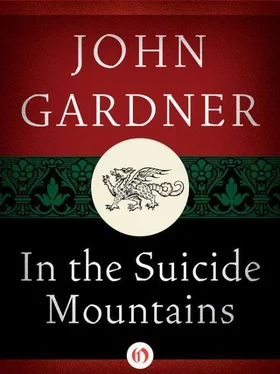These ruses worked so well that, despite all they’d told him, by the third day the abbot paid attention to no one but Prince Christopher — gently, mystically smiling at the prince, but watching like a hawk. On that day the brethren returned with their wagonloads of treasure. There were more precious jewels, more gold coins and silver coins, more beautiful works of art than even Chudu the Goat’s Son had ever before seen, though it is part of the business of a dwarf to keep track of old treasures. The monks parked the wagonloads of treasure in the barn, held mass, then began to prepare supper.
Meanwhile, the saintly old abbot prayed for the crippled and sick until all of them were cured. Armida, the prince, and the dwarf observed. “Notice,” Armida whispered, “how he holds his hands to pray.”
The prince bent forward and did as he was told. As the abbot prayed, only four fingers and a thumb on each hand peeked out from the darkness of the cassock’s sleeves; but the prince was almost certain that one more finger on each hand was tucked under, out of sight. Nevertheless, whether or not he was the six-fingered man, the abbot was curing the sufferers. If he was truly that master of disguise, that notorious murderer, how could this be? Armida herself was inclined to doubt, for the hundredth time, that she was right. She cursed, too softly for the others to hear, and bit her knuckles and waited for a sign. If her plan was successful, it would come.
That night, as usual, the abbot retired with the three friends to the stone-walled chamber for brandy, talk, and music. The prince played his fiddle for an hour and more; then he said — for it was part of the plan that the prince do most of the talking, saying exactly what Armida had coached him on, so that he might seem to the abbot to be dangerously clever—“Father, we’ve immensely enjoyed your hospitality; but I’m afraid we must leave tomorrow. I must hunt down the six-fingered man.”
The abbot smiled with his usual gentleness. “I hardly know whether to wish you luck or not,” he said. “Surely if you find him he’ll kill you on sight. But then, how can you find him — unless he , God forbid, should find you? ”
“That’s an interesting thought,” said the prince, “and I admit I’ve thought it. It’s his way, I’m told, to study a man for a few days, then steal his identity. It’s entirely possible that from some nook or cranny he may be watching me even now, preparing to slaughter me like a goose. But I’m no child. I must take my chances.”
“You’re a brave young man, my dear prince, glory of my life,” said the abbot. “I admire you for it. Perhaps you’ll get together after all, this fiend and you, and perhaps you’ll actually kill him somehow, though I doubt it. The six-fingered man will be thankful that finally it’s over, if he has any sense.”
“I doubt that he’s feeling that much misery,” laughed the prince.
“Perhaps not,” said the abbot. “If he does, it’s nobody’s fault but his own. That man should have ended it all long since. The older he gets the more surely he must see that he’s detestable.”
“I really do doubt that he thinks that way,” the prince said.
“Perhaps not, perhaps not,” the abbot agreed, nodding. “Yet he’s a master imitator, we’re given to understand. Surely he’s imitated good men, from time to time, and accidentally picked up at least a touch of decent conscience. Imitate anything long enough — gaze at anything long enough with a careful eye — and you have a tendency to become it, or at very least a tendency to respect it. I might take the case of painting. There was a time, you’ll remember, when people hated Nature. When they found Nature unavoidable, in a particular painting, they transmuted all that garish green to brown. Forced to live in the country, they transformed lawless Nature into formal gardens. Then an outlaw generation of young painters came along and painted mountains ‘as they are’; and a gasping generation of young poets came along and wrote sweet love-songs to Mont Blanc. Rich merchants with big houses in the centers of their villages learned the subtle art of turning half an acre to a forest—‘natural’ pools, concrete reindeer. What had happened? Exactly! Painters had begun imitating the world as they saw it, a world of — incredible! — fat ladies with their clothes off, green mountains, majestic bears — and the world began to imitate the paintings. Make no mistake, make no mistake! The mimic is doomed to become what he mimics, or doomed unless a miracle of good fortune intervenes. It’s like the story of the miser.”
“Miser?” said the prince.
Armida sighed.
Chapter Fourteen. The Abbot’s Last Tale
There was once a wealthy merchant named Nikita the Mean. One day as the world rolled on he went out for a walk and on his way saw an old beggar who was asking for alms. ‘For Christ’s sweet sake, good merchant, give me at least a little pittance!’ cried the beggar. Nikita the Mean tipped his nose up and passed him by.
“But a poor peasant who followed behind him felt pity for the beggar and gave him a kopek. Rich Nikita saw that everyone was watching and felt horribly ashamed; so he stopped and said to the peasant, ‘Listen, little brother, lend me a kopek. I want to give something to the beggar but I have no small change.’ The peasant gave Nikita a kopek and asked: ‘When shall I come to collect my loan?’ ‘Come tomorrow.’
“The next day the poor man went to the rich man for his kopek; he entered the broad courtyard. ‘Is Nikita the Mean at home?’ ‘He is,’ said Nikita’s wife. ‘What do you want of him?’ ‘I have come for my kopek.’ Nikita the Mean heard this and went and hid under the bed and told his wife to tell the peasant that now that she looked she found he wasn’t home after all, the peasant should come tomorrow. ‘Come tomorrow,’ said Nikita’s wife; ‘now that I look I find he’s gone.’ So the following day the peasant came again, and this time he came upon Nikita himself, standing by the gate, for there was no time for Nikita to run away. ‘I have come for my kopek,’ said the peasant. ‘Ah, little brother,’ said Nikita, ‘come and see me some other time. I have no small change just now.’ The poor man bowed low and said: ‘I will come next week.’ The following week he came a third time and was told: ‘Forgive me, dear brother, but again I have no small change. If you have change for a hundred rubles, I can give you a kopek. If not, come next month.’ A month later, the poor man went again to the rich man. When Nikita the Mean saw him through the window, he said to his wife: ‘Listen, wife, I will undress completely and lie under the ikons; and you cover me with a shroud and sit down and lament me as though I were dead. When the peasant comes for his loan, tell him that I died today.’
“The wife did as her husband commanded; she sat down and shed burning tears. The peasant came into the room and she asked, ‘What is it, dear brother?’ ‘I have come to collect my loan from Nikita the Mean,’ answered the peasant. ‘Ah, little peasant, Nikita the Mean wished you a long, happy life! He has just died.’ ‘May angels carry him to heaven!’ said the peasant. ‘And since he was a good man and gave money to beggars, let me do something for him. Permit me to wash his body.’ Before the wife could object, the peasant snatched a kettle of boiling water and poured it over Nikita the Mean. Nikita could hardly stand it; he gritted his teeth and jerked his feet. The peasant pretended not to notice and washed the body and prepared it for burial. To the wife he said, ‘Buy a coffin and bring it here, and we will put the body in it. And if I know anything at all about my friend Nikita he would not want to be buried without his money, so we will also put all Nikita’s money in the coffin, packed around his body, and then we will bear it to the church.’ The wife had no choice but to go and get a coffin, and the peasant did as he had said he would. He crammed in Nikita’s gold and jewels and his ivory boxes and silver clasps, and he placed Nikita’s golden saber over the body, and closed the lid. They carried the coffin to the church and the peasant began to groan and read the psalter over him. And Nikita’s wife stood beside him and wept burning tears.
Читать дальше












